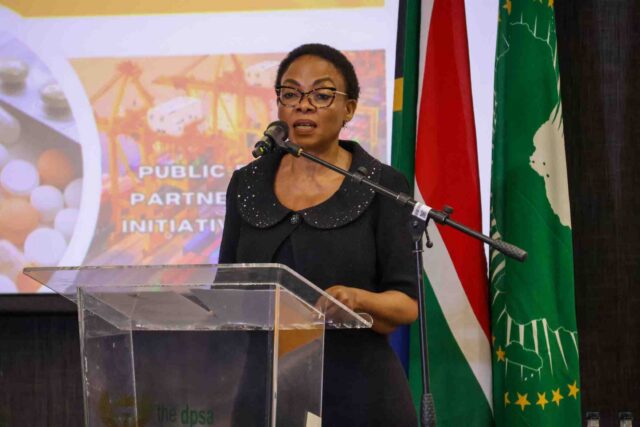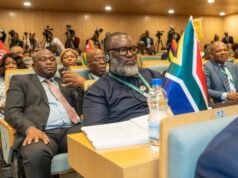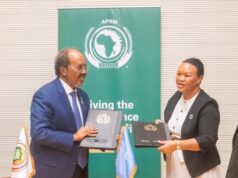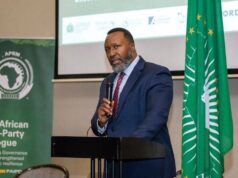“Covid‑19 laid bare the fragility of global supply chains and the peril of over-dependence on external suppliers for life‑saving medicines and vaccines. Many African countries found themselves at the mercy of distant supply markets, and faced vaccine inequity, shortages and non-supply that crippled their nationsâ€, according to the Deputy Minister for the Public Service and Administration, Ms Pinkie Kekana.
In the address to the G20 High-Level Ministerial Dialogue that was held yesterday, 14 April 2025, in Sandton, in the Gauteng Province of South Africa, Deputy Minister Kekana evoked the experiences and lessons learned from the Covid-19 pandemic to help frame discussions on the topic of the dialogue, “Accelerating AfCFTA Industrialization: A Pharmaceutical-sector focus for Africa’s healthcare security & inclusive economic growthâ€.
The G20 High-Level Ministerial Dialogue side event had been organised under the auspices of the Department of Public Service and Administration (DPSA) as a public-private-partnership initiative with the support of Aspen Pharmacare Group; Pharmaceuticals Made in SA (PHARMISA); the African Prosperity Fund; and the African Union through the AfCFTA Secretariat.
Despite the clear health and economic development slant of the dialogue, the DPSA plays a key role given its transversal mandate of setting up the Public Service norms and standards that build the capacity of the state. Moreover, the side event linked up with the role played by the Ministry for the Public Service and Administration (MPSA) as the National Focal Point of the African Peer Review Mechanism (APRM), which is an African Union (AU) instrument for tracking the progress of Member States in the implementation of the Agenda 2063 of the AU and Sustainable Development Goals of the United Nations.
“South Africa has always championed continent-wide industrial integration, under President Cyril Ramaphosa’s stewardship—as Africa’s Pandemic Preparedness Response Champion—we believe that localized and regional pharmaceutical manufacturing is the linchpin of health sovereignty, job creation, and economic transformation,†said Deputy Minister Kekana.
Deputy Minister emphasised that the rapidly changing world order that is reminiscent of the after-shock of the Covid 19 pandemic should make Africa wary of dependency on others, calling upon the continent to lead efforts in the development of their own health solutions and the localisation of the manufacture of pharmaceuticals to ensure health sovereignty, job creation, and economic transformation.
According to Deputy Minister Kekana, Africa’s response to the increasingly harsh world order necessitates the development of a vision that hinges on the three foundational pillars of collaboration, innovation, and shared purpose. These, she argued, would wean off African countries from undue dependencies on donor-funded healthcare programmes that have grave consequences should they be suddenly reduced or discontinued.
“Reduced funding stalls vaccine research and distribution, delaying the world’s ability to respond to future pandemics. And because our economies are interconnected, disruptions in Africa translate into trade shocks, labour shortages, and slowed growth worldwide. In short, cutting aid is not merely a setback for Africa; it is a collective risk to global stability, prosperity, and the health of all nations,†Deputy Minister Kekana explained.
The programme of the G20 High-Level Ministerial Dialogue side event included keynote addresses by the Secretary-General, AfCFTA Secretariat, H.E Mr Wamkele Mene; the Director-General Africa CDC, Dr Jean Kaseya; and Afreximbank President, H.E. Prof Benedict Oramah.
South Africa’s Minister of Health, Dr Aaron Motsoaledi, participated in one of the two panel discussions. The G20 High-Level Dialogue concluded with the adoption of the side meeting’s resolutions, which are expected to make it into the Declaration of the G20 Leaders’ Summit in November 2025.









